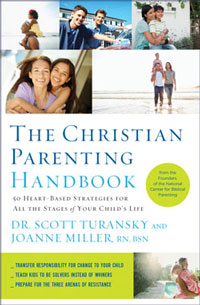Special thanks to Dr. Scott Turansky for today's blog post! He is
co-author with Joanne Miller, RN, BSN of The Christian Parenting Handbook published by
Thomas Nelson. I was privileged to preview their book last week, and it's fantastic! I hope you'll check out it out at ChristianParentingHandbook.com.
------
Charlotte lamented about her parenting by telling me this:
“My biggest problem is that I feel guilty when I can’t be
consistent. Every parenting book I’ve read talks about the importance of
consistency, but I’m running from here to there, get- ting things done, and my
husband parents differently than I do. I feel like I’m failing because I can’t
be as consistent as I would like to be.”
Charlotte has three children, ages eleven, seven, and
four. For the most part, she’s doing quite well, but she’s plagued with an
overarching sense of guilt when things go wrong. The voice inside tells her the
problems in her kids would go away if she were more consistent, but is that
really the answer?
We’ve all heard that consistency is the key to good
parenting. But many parents believe it’s more important than it really is. If
you’re doing simple behavior modification, then consistency is essential.
Giving the reward or punishment every time you see the behavior will reinforce
change.
The problem is that behavior modification embraces
humanistic thinking, the belief that people are just a higher form of animals.
The Bible teaches something very different.
God created people different from animals. He gave each
person a spiritual “heart,” and that heart affects the learning process. The
heart contains things such as emotions, desires, convictions, and passion. In
short, the heart is a wrestling place where decisions are made. A child’s
tendencies come from the heart. When a child lies to get out of trouble, that’s
a heart issue. If a brother reacts with anger each time his sister is annoying,
that’s a heart issue too. Simply focusing on behavior may provide some quick
change, but lasting change takes place in the heart. We’re not saying behavior
modification is wrong. We’re just suggesting that it’s incomplete and, in the
end, lacks the depth for long-term and lasting change.
Parents who simply use behavior modification often end up
with kids who look good on the outside while having significant problems on the
inside. Consistency can teach kids to appear good, clean, and nice, but to help
them change their hearts, other parenting skills must be added to the picture.
Developing a strong, biblical parenting philosophy
requires you to embrace a more comprehensive approach that focuses on the
heart. Looking beyond behavior modification calls for different parenting
tools. When you focus on the heart, another quality becomes even more important
than consistency: creativity.
The heart is where children hold their beliefs. It’s where
they develop operating principles about life. Kids learn through experience,
stories, activity, and modeling. Sometimes children develop resistance in their
hearts to a consistent approach.
Creativity has the ability to move around children’s
resistance and allows a truth to explode with meaning inside the heart. The
best teachers are those who use creative teaching methods to communicate their
point.
Please don’t misunderstand. Consistency is important,
especially when kids are young. But if you think more broadly about parenting
and embrace creativity and strategy in your training, you’ll be more effective
at molding the hearts of your kids at any age. Your primary task as parent is
to teach your kids, and a little work in the creativity department can make all
the difference.
For more ideas about
moving from a behavior modification to a heart-based approach to parenting,
visit biblicalparenting.info.



0 Comments:
Post a Comment
<< Home